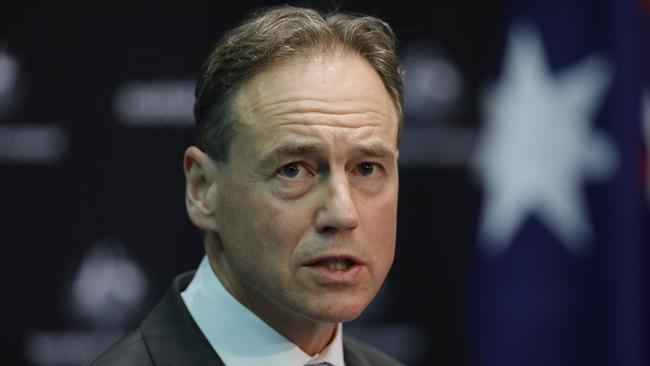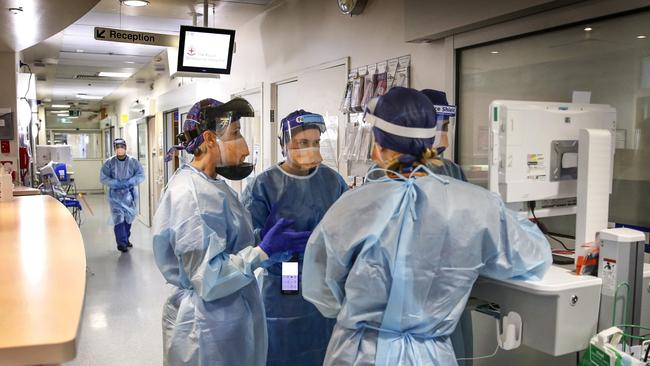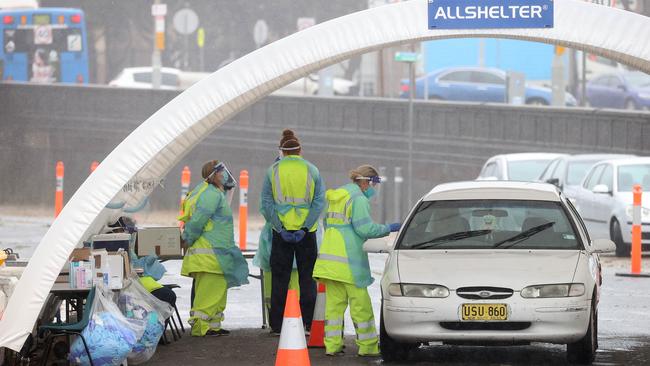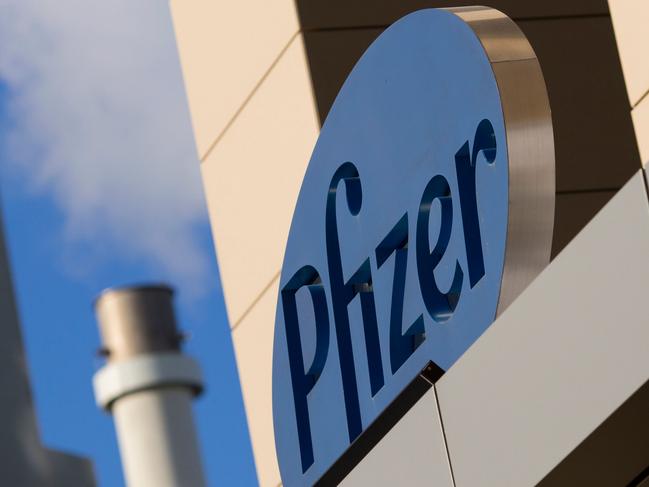COVID-19 vaccine: Australia’s rollout plan and who will receive it first
Health Minister Greg Hunt has revealed a blueprint for when the COVID-19 vaccine will be rolled out in Australia, and who will be given top priority.
National
Don't miss out on the headlines from National. Followed categories will be added to My News.
Exclusive: Australians could have to wait until the end of next year to receive the COVID-19 vaccine.
Frontline workers could begin receiving the COVID-19 vaccine from March with hopes the entire Australian population could be vaccinated by the end of 2021.
News Corp can reveal that subject to national cabinet’s approval, the first Australians to receive a COVID-19 vaccine will be 1.5 million doctors, nurses, pharmacists, pathologist, aged care workers and the elderly.
In an exclusive interview on the government’s vaccine rollout plans, Health Minister Greg Hunt said Australia’s vaccine manufacturer CSL was likely to commence manufacturing the Oxford AstraZeneca vaccine this month (November).
And he said the government will in the coming weeks finalise agreements to buy two new types of COVID-19 vaccines, including a cutting edge mRNA vaccine.
This means Australians will have access to four types of COVID-19 vaccines – the Oxford AstraZeneca vaccine, the University of Queensland vaccine and two more.
Mr Hunt said he had “high confidence” COVID-19 vaccinations would begin in the first quarter of next year possibly clearing the way to re-open our international borders at the end of 2021.

“The evidence on the first half of 2021 is strengthening and the evidence on first quarter of 2021 is strengthening and it’s likely that new contracts would also involve first quarter delivery so you know we’re thinking March may be possible,” he said.
“The expectation is that everybody who sought vaccination would be vaccinated well within 2021.
“Our goal is to have the borders open, subject to vaccination and health advice, by the end of 2021.”
The Pfizer BioNtech mRNA vaccine is currently leading the global vaccine race and it, along with Moderna’s mRNA vaccine is likely to be one of the vaccines the government is trying to purchase for Australians.
The company refused to comment.
“Pfizer will continue to work closely with all governments to support their vaccine implementation plans. Discussions with all governments remain confidential,” it said in a statement.
Conventional vaccines use a weakened form of the virus to prompt an immune response but mRNA vaccines use the virus’s genetic code to make a person’s own cells produce vaccine antigens and generate immunity.
This new age vaccine technology has never been used in humans before but it is a much quicker way to make a vaccine.
An expert government committee is currently setting priorities that will govern who gets a vaccine and when.
“There’s no surprises either the clear advice is that the first cohort is healthcare workers and the elderly,” Mr Hunt told News Corp.
This would include general practitioners, pathology workers, aged care assistants, those working with vulnerable people and pharmacists, he said.
The elderly, particularly those in aged care homes, would also be among the first to receive a vaccine because they are at greatest risk of severe illness from the virus.
It’s estimated these people number around 1.5 million and once they are protected the next to be vaccinated will be essential workers like transport workers, teachers and people working in food supply.
An expert government committee is currently determining which workers will be deemed “essential workers”.
Mr Hunt said no decision had yet been made on when children will be vaccinated and it would depend on whether the vaccines available had been tested in children.
Vaccination will be free but not compulsory and advice was that herd immunity (when enough of the population is vaccinated to protect those who are not vaccinated from disease) will be achieved by vaccinating two thirds of the population, he said.
Mr Hunt is not overly concerned about anti-vaxxers refusing to have the COVID jab.
“Australians have been great vaccinators and while there is noise from the anti-vaxxers I think they’re making more noise but having less impact,” he said.

“The indications are already that there’s very, very high public interest in being vaccinated.”
It is likely two doses of the vaccine will be required 30 days apart and careful records will be kept to ensure Australians receive two doses of the same vaccine if more than one is in use, Mr Hunt said.
The government is preparing to launch a major immunisation training program for nurses to ensure there are enough workers to provide the mass vaccination program.
A robust quality control mechanism will monitor the safety of the vaccines.
Every dose of vaccine administered to an Australian will be recorded in the Australian immunisation register so the government can track each batch of vaccine and identify any problems that emerge.
People who receive the vaccine will be sent a text message two days after they are given a vaccine asking them to report any adverse events.
Experts are warning the first vaccines will be far from perfect and may simply reduce the symptoms of the virus rather than prevent it altogether and may not provide long lasting immunity.

There are more than 200 vaccines in development and more than 40 are in clinical trials.
Several key trials are this month due to report on whether they prevent people becoming infected with the virus.
The Australian Government has struck a $1.7 billion deal for to procure 30 million doses of the Oxford AstraZeneca vaccine.
Nearly 4 million doses will be delivered to Australia in January and February 2021 and a further 30 million doses will be manufactured by CSL in monthly batches.
In addition the government has ordered 51 million doses of the University of Queensland’s COVID-19 vaccine candidate and if it proves successful, it will be manufactured by CSL. The first doses will be available by mid-2021.
Early predictions that a vaccine may be available by the end of this year are looking wobbly after several of the vaccine clinical trials were put on hold after participants became ill.
‘NOT ABSOLUTE IMMUNITY’
The world’s most advanced coronavirus vaccine won’t provide “absolute” immunity, but will likely give “protection” from the deadly disease for about five years.
Mr Hunt revealed he spoke directly with head of the AstraZeneca/Oxford University vaccine program Professor Sarah Gilbert about the potency of the drug, which is in stage three trials.
“(Prof Gilbert) said it’s likely to be, but we can’t say definitively, a multi-year defence in the order of five years as a guide, and it’s likely to give significant protection,” Mr Hunt said.
“But we can’t say yet whether we’ll be an absolute protection.”

Mr Hunt said the precise efficacy of the Oxford University vaccine, which Australia has secured 33.8 million doses of, was “yet to be determined” through clinical trials.
“But the initial, and then the progressive results with immunity and T cells, antibodies are positive,” he said.
Mr Hunt said the promising vaccine meant Australia would see a “progressive capacity” to bring people from overseas, and for residents to travel overseas “more and more” as people are vaccinated.
“2021 is obviously the year of COVID vaccines in Australia,” he said.
Mr Hunt said the results from both the Oxford University and the University of Queensland, of which Australia has secured 51 million units, were both “more positive than expected”.
“All of that is I think heartening,” he said.
“We are now close to additional contracts and there are two further ones on the advice of the medical expert panel which have been pursued and, which I am confident will be completed within the coming weeks if not earlier,” he said.
The final roll out of the vaccines in Australia will be taken to National Cabinet by Prime Minister Scott Morrison in the coming weeks.
Mr Hunt said that would include the “formal early priorities” with health workers and the elderly expected to be first recipients of a vaccine.
“But what we want to do is give every Australian … who seeks to be vaccinated, that capacity, over the course of the coming 12 months,” Mr Hunt said.
MORE NEWS
Ex-horror aged care home boss awarded $920,000 contract
Doctor behind cancer breakthrough wins PM’s top prize
Hospitals where patients are gouged up to $11 a day for TV
Foods you should eat to control deadly allergies
Originally published as COVID-19 vaccine: Australia’s rollout plan and who will receive it first

